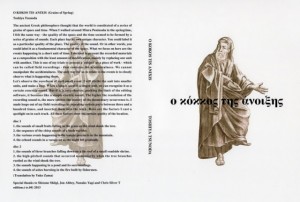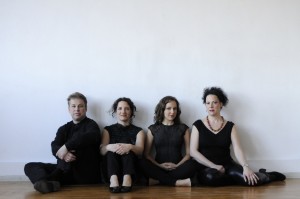Anything I write about Toshiya Tsunoda’s O Kokos Tis Anixis (Grains of Spring) is bound to be more of an anticipation of my own future with it than a cataloguing of opinions or knowledge about it. But this is a place for writing, so I’ll try to write something.
In late February, referring back to a post written the day before on Facebook about The Temple Recordings, Michael Pisaro wrote:
Today listening to Tsunoda’s equally astounding “O Kokos Tis Anixis (Grains of Spring).” It’s the most radical challenge to our experience of time that I’ve encountered in quite a while. It alternates between the flow and the “grain” (or capsule) of time in a disorienting and beautiful way. It arrests, seemingly at random, certain moments of a field recording, catching them in a loop. You begin to feel you might never get out of that loop. But then the environmental recording returns and casts you into the future. Staggering concept, engaging listening.
I ordered O Kokos Tis Anixis, along with The Temple Recordings, through erstdist and then carried the CDs around with me for weeks, unopened. (I can’t explain myself. Maybe someone else understands.) I got home from a concert late one night and decided to start listening. The sounds themselves had the most positive associations. Yes, they are sounds of spring, a season which seems to pass by in my New England experience in less time than the length of one of these tracks. I began listening, thinking it was just so beautiful, but something was happening that was eluding my grasp. Finally I went to sleep, woke up a few hours later, and realized I had to hear more.
Part of what is so compelling is the fluidity of the switch between non-interfering observation (straight field recording) and the microscopic approach of the looping. I often have the sensation of falling into the loop without realizing it’s there, and then being gently pushed out of it as a progression of material resumes, only to find myself in another one. Tsunoda writes that the number of loops can vary from 3 to 100. The duration of the sampled material can be decipherable sometimes, or it can be quite granular. Those are the moments that Tsunoda writes of when he says, “But if it is very shorter, pushing the limit of the editing software, it becomes like a simple electric sound.” These moments do not sound out of place—after all, the material is taken from the same material as the rest of the recording—but they are almost always surprising. It is as if one type of material has been gathered from the place and exhibited for viewing. It is an intervention within the context. The pieces are named for the events which have been highlighted in the scenes. These names are quite poetic as translated into English by Yuko Zama, and I’m sure they are in Japanese as well. One example:
the high-pitched sounds that occurred momentarily when the tree branches rustled as the wind shook the tree
You can see the rest of these titles at the link. Some brief sound samples are available here and here, but you’ll need to hear more to engage with the work.
There is such a delicate balance here of carefulness and spontaneity, observation and intervention. It is work that lures you in with its surface and then keeps you riveted with the remarkable tightness of the generating ideas and their execution. I have the sense that everything is placed exactly in the right place, and that the whole project would fail without an incredible attention towards the smallest detail throughout the two and a half hours of material.
Now that I know this work, I’m completely unwilling to let it go.









